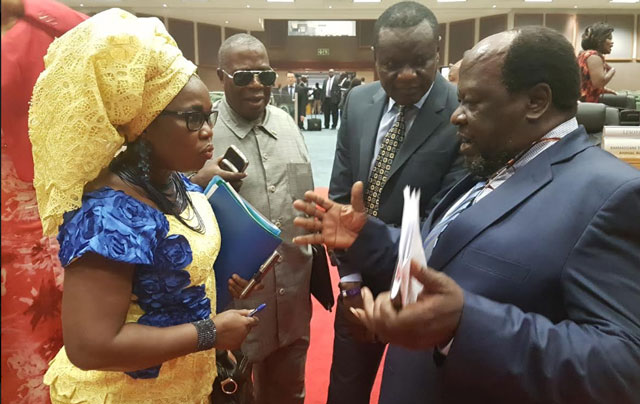
African legislators meeting in Midrand, South Africa this week have been tasked to lobby their governments to support the adoption of the Protocol on the Free Movement of Persons on the continent in the January 2018 African Union Summit.
Speaking to parliamentarians in the Committee of Trade, Customs and Immigration, the Director of Political Affairs in the African Union Commission Khabele Matlosa said African ministers have also been briefed on the progress of free movement and the issuance of an African passport; and they have reaffirmed AU’s commitment to free movement of persons in Africa.
“The ministers recognized that free movement of persons, goods and services, far outweighed the real and potential security and economic challenges that may be perceived or generated,” he said.
He explained that once the draft Protocol on Free Movement of Persons, Right of Residence and Right of Establishment is finalized, it would be presented to the AU Summit for adoption.
It is anticipated that as per the decisions of the AU policy organs, the Protocol will come into force simply upon adoption without the normal requirement of 15 ratifications by member states.
Okot Ogong says inta-Africa trade is key
Legislators however voiced concern about the challenges associated with free movement of persons, with others saying that they were already burdened with the problem of refugees in their countries.
They also voiced concern about the public mistrust about free movement of people, of foreigners taking up jobs and of governments’ concern about the risks paused by criminal elements crossing national borders.
According to Uganda’s Felix Okot Ogong, Africa needs to promote economic integration and intra-Africa trade first, since internal displacement and refugees are already a challenge.
“We cannot talk about free movement of people in Africa when we have internally displaced people. If I am not travelling to trade and I am not a tourist, why should I travel? We must travel to trade so that we promote the development of Africa,” he said.
The draft protocol defines free movement of persons to mean unrestricted mobility and migration of African citizens across borders for various livelihood needs. The current draft of the Protocol covers aspects of entry, residence and establishment.
The argument advanced for free movement of persons is that it will deepen continental integration, advance human and people’s rights, and it is a move towards a visa-free Africa, and a common African passport.
Recent studies by the African Development Bank, titled “Africa Visa Openness Report 2016”, revealed that Africa was closed to Africans while wide open to others. The study showed that Africans need visas to travel to 55% of other countries and yet North Americans required a visa to travel to 45% of African countries.
The study noted East and West Africa as the regions with free movement of persons, followed by Southern Africa. North and Central Africa ranked lowest.
The legislators resolved that in regard to the common African Passport, states need to agree on its implementation and enact the necessary legislation in their own countries.
An all-African passport is part of the African Union’s Agenda 2063, which envisions an Africa that is integrated and united. Agenda 2063 calls for “an African passport, issued by Members States, capitalizing on the global migration towards e-passports, and with the abolishment of visa requirements for all African citizens in all African countries by 2018.”
 The Independent Uganda: You get the Truth we Pay the Price
The Independent Uganda: You get the Truth we Pay the Price





